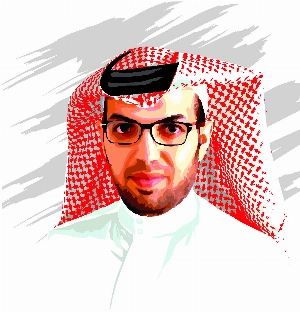
The title of this article is not an exaggeration, but irrefutable and undeniable truth. Evidence of this can be found in the exhibition, “Trade Routes in Arabia - Masterpieces of the Monuments of Saudi Arabia through the Ages”, on display in the Louvre in Abu Dhabi. It is one of the most important Saudi international exhibitions reflecting the cultural heritage of the Kingdom and the Arabian Peninsula. The Kingdom is the cradle of ancient human civilizations, although some people intentionally or unintentionally try to market the propaganda that the Arabian Peninsula did not create civilization. We believe that the Arabian Peninsula, which Saudi Arabia occupies most of, is the birthplace of many civilizations that have flourished within its borders. Professor of Archaeology, Abdulrahman Al-Tayeb Al-Ansary, one of the most famous archaeologists in Saudi Arabia, states that there were more than 30 civilizations in the Arabian Peninsula. There were civilizations and cultures at the dawn of history, the cultures of the ancient nations, the cultures of the early Arab kingdoms, the cultures of the medieval Arab kingdoms and the cultures of the late kingdoms. For example, Al-Ula governorate located in the western part of the Arabian Peninsula is considered to be a most important cultural and civilization heritage site. Four civilizations flourished and settled in it: Thamud civilization 3,000 years BC, the Kingdom of Dadan, the Kingdom of Lahyan (600 BC - 150 BC) and then the Kingdom of Nabataeans (150 BC - 106 AD). In the south of the Arabian Peninsula, there was the Kingdom of Himyar I and II (110 BC - 527 AD), an Arab kingdom whose borders extended from Osan to the south, to Najran in the north, and Oman in the east, to Asir in the west.
In the middle of the Peninsula, there was the Kingdom of Kindah (200 BC - 633 AD), an Arab Kingdom, whose capital, Faw, is now one of the most important archaeological discoveries on the Arabian Peninsula, if not in the world. It represents the embodiment of the living example of the Arab city before Islam with all its essentials of housing, roads, markets, tombs and wells. It was an important commercial center and a junction of convoys carrying minerals, grains and textiles.
Another important discovery, also in the middle of the Peninsula, is the site of the ancient civilization of the headquarters (Al-Makar), which was lately discovered and dates back 9,000 years, wherein archaeologists found indications of symbols of the original Arab culture, such as horsemanship, falconry, hunting dogs (Saluki), and ornaments with Arab daggers. The archaeological antiquities, discovered in that site, show that the inhabitants tamed horses 9,000 years ago, which contradicts the prevailing narration that the horse was first tamed in Central Asia 5,500 years ago.